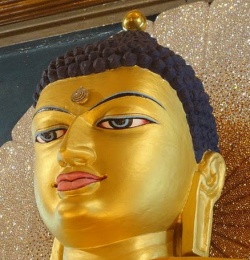Difference between revisions of "Four Dhyanas"
Jump to navigation
Jump to search
(Created page with "thumb|250px| <poem> Four DhyanasKhenpo Pema Vajra says: The first dhyana level which is accomplished in this way has five features: {...") |
|||
| (3 intermediate revisions by 2 users not shown) | |||
| Line 1: | Line 1: | ||
[[File:Buddh on Flicrk.jpg|thumb|250px|]] | [[File:Buddh on Flicrk.jpg|thumb|250px|]] | ||
| − | + | '''[[Four dhyanas]]''' (Tib. {{BigTibetan|[[བསམ་གཏན་བཞི་]]}}, Tib. [[samten shyi]], [[Wyl.]] ''[[bsam gtan bzhi]]'') — the four levels of [[dhyana]], corresponding to the four levels of the [[form realm]]. [[Khenpo Pema Vajra]] says: <br> | |
| − | [[Four | + | |
| − | The [[first dhyana]] level which is accomplished in this way has five features: {{Wiki|conception}}, [[discernment]], [[joy]], [[physical]] wellbeing and samadhi.The [[second dhyana]], which is even more [[peaceful]], has four features: the perfect clarity in which {{Wiki|conception}} and [[discernment]] have been relinquished, [[joy]], [[physical]] wellbeing and [[samadhi]]. The [[third dhyana]], which is more [[peaceful]] still, has five features: [[equanimity]] in which the {{Wiki|concept}} of [[joy]] has been abandoned, [[mindfulness]], | + | #The [[first dhyana]] level which is accomplished in this way has five features: {{Wiki|conception}}, [[discernment]], [[joy]], [[physical]] wellbeing and [[samadhi]].<br> |
| − | {{ | + | #The [[second dhyana]], which is even more [[peaceful]], has four features: the [[perfect clarity]] in which {{Wiki|conception}} and [[discernment]] have been relinquished, [[joy]], [[physical]] wellbeing and [[samadhi]]. <br> |
| − | [[Category:Dhyana]] | + | #The [[third dhyana]], which is more [[peaceful]] still, has five features: [[equanimity]] in which the {{Wiki|concept}} of [[joy]] has been abandoned, [[mindfulness]], [[watchful awareness]], [[physical]] wellbeing and [[samadhi]]. <br> |
| + | #The [[fourth dhyana]], which is called the [[Wikipedia:Absolute (philosophy)|ultimate]] [[dhyana]] because it is yet more [[peaceful]], has four features: the [[neutral]] [[sensation]] in which the [[sensation]] of [[physical]] wellbeing has been abandoned, [[mindfulness]], the [[mental formation]] of [[equanimity]], and [[samadhi]]. <br> | ||
| + | {{RigpaWiki}} | ||
| + | |||
| + | [[Category:Dhyana]]{{BuddhismbyNumber}} | ||
Latest revision as of 10:23, 22 April 2014
Four dhyanas (Tib. བསམ་གཏན་བཞི་, Tib. samten shyi, Wyl. bsam gtan bzhi) — the four levels of dhyana, corresponding to the four levels of the form realm. Khenpo Pema Vajra says:
- The first dhyana level which is accomplished in this way has five features: conception, discernment, joy, physical wellbeing and samadhi.
- The second dhyana, which is even more peaceful, has four features: the perfect clarity in which conception and discernment have been relinquished, joy, physical wellbeing and samadhi.
- The third dhyana, which is more peaceful still, has five features: equanimity in which the concept of joy has been abandoned, mindfulness, watchful awareness, physical wellbeing and samadhi.
- The fourth dhyana, which is called the ultimate dhyana because it is yet more peaceful, has four features: the neutral sensation in which the sensation of physical wellbeing has been abandoned, mindfulness, the mental formation of equanimity, and samadhi.
